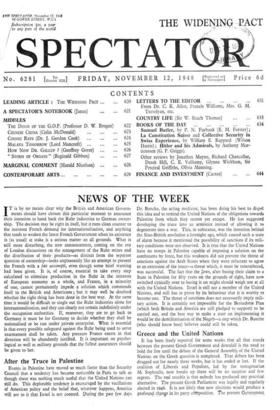After the Truce in Palestine
Events in Palestine have moved so much faster than the Security Council that a tendency has become noticeable in Paris to talk as though there was nothing much useful that the United Nations can still do. This deplorable tendency is encouraged by the vacillations of American policy and the belief that, whatever happens, America will see to it that Israel is not coerced. During the past few days
Dr. Bunche, the acting mediator, has been doing his best to dispel this idea and to remind the United Nations of the obligations towards Palestine from which they cannot yet escape. He has suggested developing the truce into an armistice instead of allowing it to degenerate into a war. This, in substance, was the intention behind the Sino-British resolution a fortnight ago, which caused such a state of alarm because it mentioned the possibility of sanctions if its mili- tary conditions were not observed. It is true that the United Nations have no troops in Palestine capable of imposing a solution on the combatants by force, but this weakness did not prevent the threat of sanctions against the Arab States when they were reluctant to agree to an extension of the truce—a threat which, it must be remembered, was successful. The fact that the Jews, after basing their claim to a State in Palestine for fifty years on the grounds of right, have now switched cynically over to basing it on might should weigh not at all with the United Nations. Israel is still not a member of the United Nations, and still has to prove by its behaviour that it is worthy to become one. The threat of sanctions does not necessarily imply mili- tary action. It is certainly not impossible for the Bernadotte Plan (which both Britain and America are still pledged to support) to be carried out, and the best way to make a start on implementing it would be the demilitarisation of the Negeb—a step which Dr. Bunche (who should know best) believes could still be taken.


































